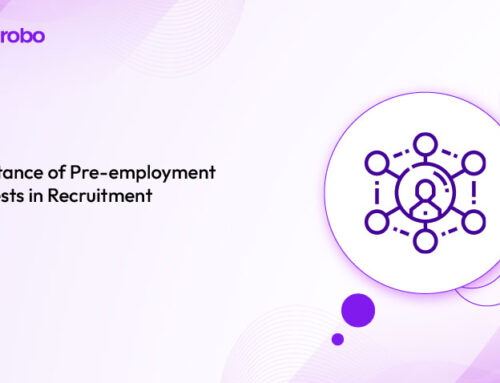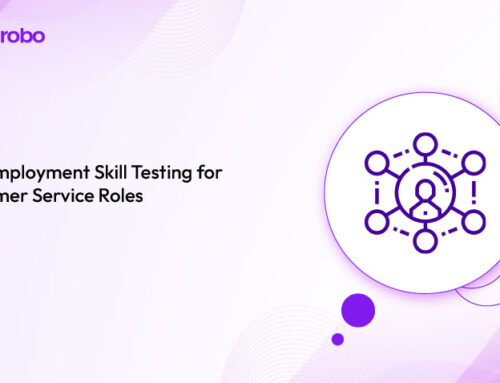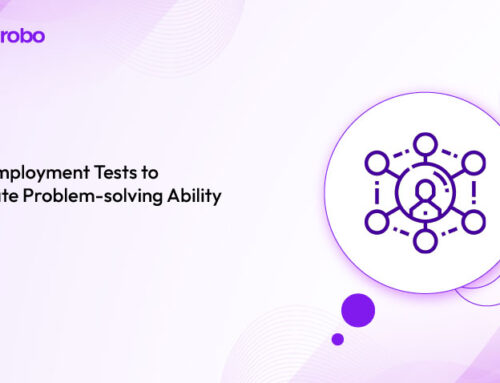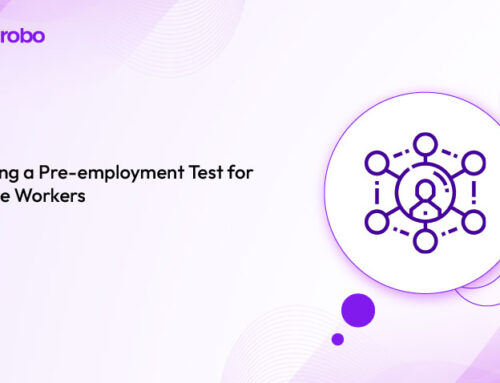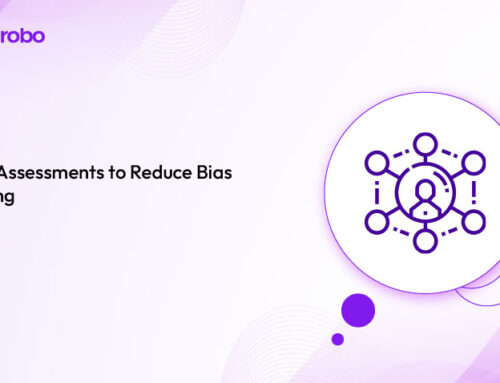
Pre-employment evaluations have traditionally been manual, time-consuming, expensive, and prone to bias. It was difficult to predict if a candidate would be successful after being hired because they weren’t created with a certain work role in mind. To find one top talent who can benefit the company, the hiring manager or recruiters must sift through hundreds or thousands of qualified and unqualified (frequently) candidates. Even companies invest a lot of time and money to find candidates who can create an impact on business outcomes.
The hiring procedure involves background checks, interviews, assessments, and other steps to identify candidates who can’t operate with intuition. To make an objective judgment, the recruiters rely on the data of the applicant.
To identify the best prospects, though, and reduce the possibility of making a wrong hiring decision, many recruiters today use HR assessment tools. These tools assist employers in determining whether applicants possess the necessary skill sets, expertise, and workplace requirements and assist in the selection of individuals who have the potential to advance the company.
HR assessment tools are designed to evaluate the skills, potential, and fit of candidates during the recruitment process. They provide valuable insights into a candidate’s capabilities, helping HR professionals make informed decisions. In this article, we will explore the benefits of using HR assessment tools, the different types available, and the best practices for implementing them in your recruitment process.
What is an HR Assessment Tool?
An HR Assessment Tool for hiring is a resource or platform utilized by HR professionals to streamline and enhance the recruitment process. This tool could include applicant tracking systems (ATS), which are used to collect, sort, and manage applications, as well as pre-employment assessment tools designed to gauge the skills, aptitude, personality traits, and cultural fit of potential candidates.
In essence, these tools assist in identifying candidates who are most likely to succeed in a particular role and within the company culture. They also support HR teams in maintaining a structured and bias-free hiring process by offering standardized assessment metrics.
By leveraging an HR Assessment Tool for hiring, organizations can make more informed hiring decisions, reduce time-to-hire, improve candidate experience, and increase the overall efficiency of their recruitment process.
Understanding Different Types Of HR Assessment Tools
HR assessment tools come in various forms, each serving a specific purpose in the evaluation process. One type of HR assessment tool is the HR-specific assessment tool, which is designed to evaluate the skills and potential of candidates specifically for HR roles. These tools assess a candidate’s knowledge of HR policies and procedures, their ability to handle employee relations, and their understanding of HR best practices.
By using HR-specific assessment tools, organizations can ensure that their HR professionals possess the necessary competencies to effectively manage their workforce. Another type of HR assessment tool is the human resource evaluation method and technique. These tools focus on evaluating the overall performance of the HR department or individual HR professionals. They assess factors such as communication skills, problem-solving abilities, and strategic thinking.
By using human resource evaluation methods, organizations can identify areas for improvement and provide targeted training and development opportunities for their HR professionals.
Why do we Need an HR Assessment Tool?
HR assessment tools are essential for several reasons. Firstly, they help organizations streamline their hiring process, allowing them to evaluate candidates more efficiently and effectively. HR Assessment Tools are crucial for several reasons:
Improved Hiring Decisions:
These tools assist in finding the best candidates who fit the job description and the corporate culture, resulting in successful, long-term employment.
Efficiency:
They save time and money by streamlining HR procedures including hiring, orientation, performance reviews, and succession planning.
Data-driven decisions:
With the help of these tools, HR teams may support decision-making procedures with quantitative data, moving away from subjective judgment and towards more objective, fact-based choices.
Skills Gap Analysis:
To create efficient training programs, HR assessment tools can help identify areas where current employees might require more training or development.
Employee Engagement:
To keep top talent and sustain a healthy work environment, it is essential to assess and track employee happiness and engagement.
Overall, the use of HR Assessment Tools can lead to significant improvements in an organization’s HR function and overall business performance.
The Importance Of Recruitment Assessment Tools
There are many different things to take into account while evaluating prospects. Although degrees, experience, and skills are all significant factors, they are not the only ones you should consider. Additionally, you must ensure that the applicant’s personality will get along well with the rest of your staff and that your company’s culture.
HR assessment tools are useful in this situation. They can assist you in evaluating the qualifications of candidates and their suitability for your workplace culture. Finding the ideal applicant is crucial, and doing so can lower turnover rates and boost employee satisfaction.
Assessments may be used by HR professionals for employee training and development. You can be certain that you’re choosing the optimal course of action for your company by using HR evaluation tools.
Benefits Of Using HR Assessment Tools
Organizations can gain a wide range of advantages from using HR Assessment Tools, including:
- Enhanced Decision-Making: These tools offer data-driven insights that can help HR decide on hiring, promotions, succession planning, and employee development in an informed manner.
- Increased Efficiency: HR Assessment Tools increase the effectiveness of HR processes by automating routine tasks like screening resumes and monitoring employee performance.
- Better Talent Acquisition: By streamlining the hiring process and assisting in the identification of high-potential individuals, these solutions improve the caliber of new workers while also decreasing the time and expense per hire.
- Skills Gap Identification: To create training and development programs to close those gaps and foster a more competent and productive staff, HR can detect gaps by evaluating the skills and abilities of current employees.
- Improved Compliance: HR assessment tools reduce the risk of non-compliance and the associated fines by ensuring that HR practices adhere to labor laws and regulations.
- Employee Development: These tools allow HR to monitor employee performance, spot opportunities for development, and generate individualized development programs that encourage employee advancement and job satisfaction.
- Reduced Bias: HR Assessment Tools support a more diverse and inclusive workforce by reducing unconscious biases that might affect hiring and assessment decisions by standardizing evaluation standards.
- Better Retention: These tools can provide insights into employee engagement and satisfaction, helping to implement strategies that improve retention and reduce turnover.
Best Practices For Implementing HR Assessment Tools In Recruitment
To maximize the effectiveness of HR assessment tools in the recruitment process, organizations should follow best practices. Firstly, it is essential to clearly define the competencies and skills required for the role. This will help in selecting the most appropriate assessment tools and ensure that they align with the organization’s requirements.
Secondly, organizations should ensure that the assessment tools are valid and reliable. The degree to which an assessment captures what it sets out to capture is referred to as validity. The consistency of the assessment outcomes is referred to as reliability. In order to guarantee that assessments yield reliable and consistent results, they should be properly evaluated and verified.
Another best practice is to involve multiple stakeholders in the assessment process. This can include HR professionals, hiring managers, and subject matter experts. By involving multiple perspectives, organizations can ensure a comprehensive evaluation of candidates and reduce biases in the assessment process.
Top HR Assessment Tools For Hiring And Employee Development
There are numerous HR assessment tools available in the market, each offering unique features and capabilities. Here are some of the top HR assessment tools for hiring and employee development:
Psychometric Assessments:
These assessments measure a candidate’s personality traits, cognitive abilities, and behavioral tendencies. They provide insights into a candidate’s work style, communication preferences, and problem-solving abilities.
Skills Assessments:
Skills assessments evaluate a candidate’s technical and soft skills relevant to the role. They assess factors such as computer literacy, language proficiency, and customer service skills.
Behavioral Interviews:
Behavioral interviews involve asking candidates to provide specific examples of past behaviors or experiences. This helps assess a candidate’s ability to handle challenging situations, work in a team, and demonstrate key competencies.
Simulation Exercises:
Simulation exercises recreate real-life scenarios that candidates may encounter in the role. They assess a candidate’s ability to apply their knowledge and skills to solve problems and make decisions.
Assessment Centers:
Assessment centers are a combination of various assessment methods, such as group exercises, role-plays, and presentations. They provide a comprehensive evaluation of a candidate’s skills, competencies, and potential.
Choosing The Right HR Assessment Tools For Your Organization
When selecting HR assessment tools for your organization, it is essential to consider your specific needs and requirements. Start by identifying the competencies and skills that are critical for success in your organization. Next, assess the available assessment tools and evaluate how well they align with your requirements. Consider factors such as validity, reliability, and ease of use.
Additionally, it is important to involve key stakeholders in the decision-making process. This can include HR professionals, hiring managers, and subject matter experts. Their input will help ensure that the selected assessment tools meet the needs of the organization and are aligned with its goals.
Lastly, consider the scalability and flexibility of the assessment tools. As your organization evolves, your assessment needs may change. Choose tools that can adapt and grow with your organization, allowing you to assess candidates at various levels and for different roles.
Guidelines For Efficiently Utilising HR Assessment Tools
Human Resource (HR) assessment tools can be an effective way of improving your company’s recruitment, management, and development processes. To get the most out of these technologies, though, careful consideration and planning must go into their implementation. Here are some pointers for using HR assessment tools effectively.
Define Your Objectives:
Recognize and specify the goals you have for the HR evaluation. Do you want to increase hiring, find out where there are skills gaps, boost productivity, or anything else? A clear purpose will direct your tool selection and aid in success measurement.
Choose the Right Tools:
HR assessment tools come in several varieties. Some are more appropriate for certain goals, sectors, or firm sizes than others. To locate the best tools for your needs, thoroughly consider your options, take advantage of trial periods, and speak with peers or business professionals.
Integrate with Existing Systems:
Pick HR evaluation tools that can be connected with your current HR systems if at all possible. Data administration and analysis can be made simpler as a result.
Train Your Team:
The individuals who will use the evaluation tools must be aware of how they operate, what they are used for, and how to interpret the results. To ensure that your team can utilize the tools efficiently, invest in training.
Measure the Results:
Measure the results to determine the tool’s effectiveness. Use key performance indicators (KPIs) pertinent to the initial goals you set. You may monitor the quality of employees, the time it takes to fill a position, or the retention rate if you’re utilizing the platform for hiring.
Promote Transparency and Fairness:
All assessment procedures must be open, impartial, and fair. Be sure to use the assessment results properly and without discrimination.
List Of Top Essential HR Assessment Tools for 2023
Skillrobo
Skillrobo is a highly advanced and AI-powered pre-employment assessment tool that focuses on evaluating candidates’ technical skills. It offers a wide variety of tests made to evaluate one’s aptitude, problem-solving skills, programming knowledge, and other characteristics.
The evaluation process can be automated with Skillrobo, which uses artificial intelligence to quickly analyze applicant responses and deliver results. This not only gives recruiters vital time back, but it also guarantees fair and unbiased assessments. Additionally, Skillrobo enables test modification, allowing recruiters to create tests that are relevant to the demands of the jobs they are filling.
By delivering skill mapping tools, Skillrobo goes beyond simple assessment and offers insightful data on candidates’ strengths and weaknesses. The candidate reports that are provided give recruiters a thorough analysis of each contender’s performance. With Skillrobo, businesses can speed up the hiring process, efficiently screen applicants, and find top talent with the necessary technical know-how.
- Features: It provides automated evaluation, customizable tests, and a variety of assessment types including coding, aptitude, and psychometric assessments.
- Strengths: Skillrobo’s AI-powered platform enables accurate evaluation of technical skills, and its customizable tests offer flexibility.
- Considerations: Skillrobo may have a narrower focus on technical assessments and may not offer as broad a range of assessments for other HR functions.
Mettl
Mercer Mettl has established a solid name for itself in the industry as a digital pre-employment evaluation. This thorough tool aids in evaluating the essential qualities and abilities of the potential candidates. It has evolved into a foundation for learning skills and assessing core traits since it is built with the greatest proctoring technology available.
- Features: It offers a wide range of assessments, including aptitude, behavioral skills, coding, and leadership qualities. Mettl also provides AI-based proctoring and advanced analytics.
- Strengths: Mettl’s comprehensive assessment library and advanced analytics make it a versatile tool for evaluating candidates and assessing employee skills.
- Considerations: Some users may find Mettl’s interface and customization options slightly less intuitive compared to other tools.
TestGorilla
Through the use of screening tests, TestGorilla assists recruiters in making impartial, simple, and quick hiring judgments. The technology can instantly analyze the test and forecast how well a candidate would perform on the job. To save time on interviews and screening, employers often choose to use pre-employment testing tools.
- Features: It provides a vast library of assessments covering cognitive abilities, job-specific skills, personality traits, and more. TestGorilla also offers video interviews and custom test creation.
- Strengths: TestGorilla’s diverse test library, user-friendly interface, and customization options make it suitable for assessing candidates across different roles and skills.
- Considerations: TestGorilla may not have the same level of specialization in technical assessments as some other tools on this list.
iMocha
iMocha is a digital skills assessment tool driven by AI that swiftly assesses more than 2,000 talents. With iMocha, the largest skills repository in the world, remote hiring is now simplified. This user-friendly platform also enables live interviews to evaluate analytical, coding, and communication skills, as well as the quickest custom skill assessment to test any requirement. The technology gives accurate skill competence reports using AI-powered insights and AI-enabled proctoring.
- Features: It offers a vast library of pre-built assessments, customizable tests, real-time coding simulators, and additional features like video interviews and candidate ranking.
- Strengths: iMocha’s broad range of assessments and interactive features make it suitable for evaluating candidates across various job roles and skills.
- Considerations: Organizations requiring highly specialized assessments outside of iMocha’s existing test library may need to explore customization options.
Adaface
Adaface provides a system that uses AI to evaluate candidates for software opportunities and automate first-round technical interviews. HR managers can arrange and carry out technical interviews with the aid of this tool. It is a smart chatbot with the ability to evaluate engineering questions, engage in technical conversations with candidates, and more.
- Features: It offers a wide range of coding assessments, including programming languages and frameworks. Adaface uses AI for evaluating candidates’ coding skills and provides detailed reports.
- Strengths: Adaface’s AI-powered coding assessments and detailed reports enable accurate evaluation of technical skills for software engineering positions.
- Considerations: Organizations requiring assessments for non-technical roles or a broader range of assessments may need to explore other tools.
Xobin
Xobin, a pre-employment evaluation tool, provides a complete solution for evaluating prospects during the hiring process. Xobin assists businesses in making knowledgeable recruiting selections by focusing on both technical and behavioral assessments. The testing platform offers a wide variety of tests, including evaluations of cognitive, personality, technical, and domain-specific expertise. Recruiters can identify top talent by using Xobin to acquire insightful information about a candidate’s technical ability, problem-solving skills, and behavioral capabilities.
- Features: It provides a comprehensive test library covering technical, behavioral, and domain-specific assessments. Xobin offers video interviews, candidate reports, and plagiarism checks.
- Strengths: Xobin’s focus on both technical and behavioral assessments, along with additional features like video interviews, makes it suitable for evaluating candidates holistically.
- Considerations: Users with specific assessment requirements outside of Xobin’s library may need to consider the customization options and test coverage.
Conclusion
As organizations look for the finest candidates for open positions in a more efficient manner, the usage of HR evaluation tools is growing more and more common. These methods can be used to evaluate someone’s aptitude, compatibility, and intelligence, which could result in a more productive workforce. It is crucial to understand the job requirements when utilizing these tools and, if necessary, to use a variety of evaluation techniques. This way, you can be certain that the applicants who are evaluated are a suitable fit for the position.
Choosing the right HR assessment tools is crucial for effective candidate screening, selection, and employee development. These tools provide valuable insights into a candidate’s skills, potential, and fit for the organization. Skillrobo is one of the finest pre-employment assessment tools which helps in hiring candidates who possess role-specific skills and assist in organizational growth and development.
By using Skillrobo’s HR assessment tools, organizations can make informed decisions, reduce biases, and improve the efficiency of their recruitment process. Remember to follow best practices when implementing HR assessment tools and select tools that align with your organization’s needs. With the right tools in place, you can build a strong and capable workforce that drives organizational success.
Click Here! Implement Skillrobo’s pre-employment assessment tools in your recruitment process today to drive organizational success.
Table of content
- What is an HR Assessment Tool?
- Understanding Different Types Of HR Assessment Tools
- Why do we Need an HR Assessment Tool?
- The Importance Of Recruitment Assessment Tools
- Best Practices For Implementing HR Assessment Tools In Recruitment
- Top HR Assessment Tools For Hiring And Employee Development
- Choosing The Right HR Assessment Tools For Your Organization
- List Of Top Essential HR Assessment Tools for 2023
- Conclusion

